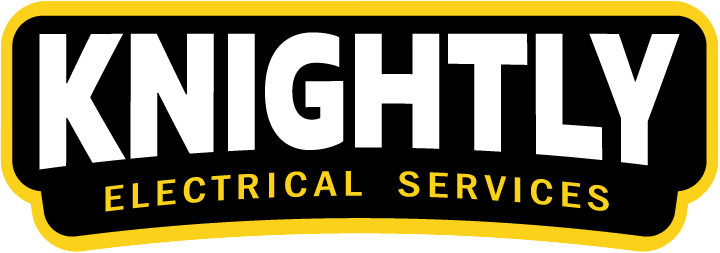7 Extension Cord Safety Tips for Homeowners
- Knightly Electrical Services

- Jun 25
- 4 min read

Extension cords provide a convenient way to get power where you need it, but unfortunately, many people fail to understand the risks associated with the improper use of extension cords. In fact, the Electrical Safety Foundation International explains that extension cords lead to more than 3,300 house fires, 50 deaths, and more than 270 injuries each year.
But what does “proper use” even mean? What do you have to do to sidestep these risks?
Don’t worry — we’ll share seven of the most important safety tips to follow to help keep your home and family safe.
Seven Extension Cord Safety Tips

We’re not saying that you can never use extension cords, but it’s important to recognize the potential dangers they represent. So, while you should probably try to avoid using them when possible, be sure to keep the following safety tips in mind when they’re necessary.
1. Inspect extension cords before each use.
Because of the way they’re often used (and abused), extension cords tend to accumulate damage faster than most people realize. But after even just a few months of use, many extension cords develop nicks in the insulation or bent prongs — problems that can lead to electric shocks and fires, among other dangerous outcomes.
So, be sure to inspect your extension cord closely every single time you use it. If you notice any kind of damage, discard and replace it immediately.
2. Pick the right extension cord for the job.

Not all extension cords are made equally, and each is intended for a specific type of use. So, be sure to use indoor-rated extension cords when you need one inside your home and outdoor-rated extension cords when you need to use one outside.
Additionally, be sure to use an extension cord that’s rated for the type of device you’re using it for. For example, a light duty extension cord may be fine for powering an alarm clock, but you want to upgrade to a heavy-duty cord to power your shop vac.
3. Never cover cords with rugs.
Many people like to run extension cords under rugs, runners, or carpets to keep them from being eyesores. And some people even do this to prevent the cord from being a trip hazard. But while homeowners may do this in an attempt to keep everyone safe, it actually does the opposite, as it can cause heat buildup in the cord, which may lead to a fire.
Instead, try to leave extension cords uncovered at all times, so that they can shed excess heat in the way they’re designed to.
4. Fully uncoil long extension cords.

People often use much longer extension cords than their current needs require. You may only need 10 feet of electric cord to power your circular saw right outside your garage, but you grab your 100-foot-long cord because it’s handy. This is never ideal, but when it is unavoidable, be sure to uncoil the cord completely.
Leaving the cord coiled up may keep it nice and tidy, but it can also cause heat to build up in the cord, which may lead to a fire.
5. Never connect extension cords to other extension cords.
While there can be problems associated with using an extension cord that is much longer than you need, it is important to reach for a cord that is long enough to accommodate your needs. But unfortunately, people who find that their cord isn’t long enough often plug one electric cord into another, creating something called a “daisy chain.”
This creates significant safety risks and raises the resistance of the overall power chain, which may reduce the performance of the device you’re trying to operate.
6. Don’t yank on the cord to unplug it.

One of the most common mistakes people make with electric cords is pulling on the cord when it’s time to unplug it. It’s an understandable habit, but it’s one that’s important to avoid.
When you pull on the cord, it can damage the internal connections or even lead to bent blades.
Instead, just take the time to grasp the actual plug and pull it out gently.
7. Never use extension cords over the long term.
This is likely the most common and hazardous mistake people make with extension cords. It’s important to understand that electric cords are designed for temporary, short-term use. You can use one for a couple of hours to keep your kids’ inflatable bounce house working, but you don’t want to use one to power a space heater all winter.
In situations where you’re going to need the cord for some time, it’s better to simply have a new outlet installed in the place you need it.
Knightly Electrical Services Helps You Avoid the Need for Extension Cords Entirely!

The tips provided above will undoubtedly help reduce the risks of house fires or electric shocks when using extension cords. But reducing the risks doesn’t guarantee that your extension cords won’t cause problems.
Fortunately, completely eliminating these risks is fairly simple; you simply need to allow our licensed electricians to install additional electrical outlets in or around your home. Doing so is much more affordable than you’d think, and it doesn’t even take very long — we can usually complete this kind of job in a couple of hours.
And aside from making your house safer, having additional outlets installed will provide additional convenience. You won’t have to lug around an extension cord to enjoy a fan on your patio or avoid tripping over the cords that are keeping your home office equipment running.
Contact us today to discuss your electrical needs or just schedule a knight right now!





Comments